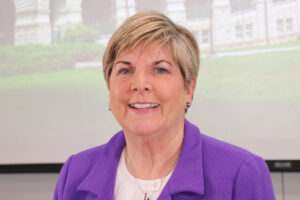Interview of Sue Peterson, May 13, 2025
Interviewed by Mark Tallman
Sue Peterson reflects on how she became involved in state politics and how her various positions in the executive and legislative branches taught her “the process” it took to get anything accomplished in the Statehouse. She later used these experiences in her role as the Assistant to the President at Kansas State University (KSU) to help that institution secure significant opportunities. The interview includes stories about people and programs they championed. These opportunities included KSU’s selection as the location for the National Bio and Agro-Defense Facility and the transformation of the Kansas Technical Institute in Salina into K-State Salina. Show MorePeterson shares that her role was “to advocate, and to educate, and…to defend” her institution. Show Less



